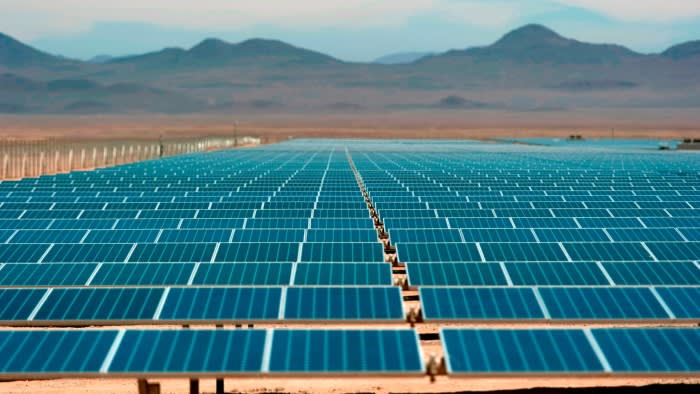Stay informed with free updates
Simply sign up to the Renewable energy myFT Digest — delivered directly to your inbox.
Cleantech businesses that raised hundreds of millions of dollars from SoftBank, Amazon and other big investors are closing, while other green companies — including some touted by the Biden administration — are struggling to survive.
Start-up cleantech businesses that easily raised money from venture firms just two or three years ago are now finding it harder to get hold of fresh cash. Stung by high interest rates and some delays from federal tax credit support, cleantech businesses have found that winning investments from private equity and infrastructure funds has become more difficult.
These challenges could dent the Biden administration’s goals for renewable energy growth and reducing carbon emissions.
In August, Moxion Power, a battery start-up that raised funds from Amazon’s Climate Pledge Fund, filed for bankruptcy. So too did SunPower, a publicly traded US solar company controlled by oil major Total of France.
Moxion and SunPower are among four big renewable energy companies that have filed for bankruptcy so far this year — the most since 2014 — according to Bloomberg data that includes companies with more than $50mn in liabilities. Ambri, a battery company that raised funds from a Bill Gates venture fund, also filed for bankruptcy, as did Enviva, a wood pellets provider.
Also in August, Swell Energy, a solar energy and battery provider that raised $120mn in 2022 from SoftBank’s Vision Fund, Ares Management and others, said it was winding down operations in its current form. The California business, which has not filed for bankruptcy, had previously partnered with Ares to raise $450mn in project financing in 2020. Suleman Khan, Swell’s chief executive, said its fleet of solar and battery systems would remain operational and it would work with utilities and battery makers to make sure power plant operations continued.
Referring to the “missing middle” in private fundraising — the failure to bring companies from their start-up phase to commercial viability at scale — Arash Nazhad, co-head of the cleantech group at Moelis, said the climatetech and energy transition sectors “are particularly affected because of the capital intensity required for impactful solutions.”
“An increasing number of companies are at risk, particularly those spending more than they generate without a clear path to becoming cash flow positive,” he added.
To be sure, some cleantech businesses are continuing to raise money. Silicon-based battery developer Sila Nanotechnologies raised $375mn in June. Svante, which manufactures filters and carbon capture machines to remove carbon emissions, raised $100mn in August from Canada Growth, an independent C$15bn fund to help the country accelerate cleantech businesses.
However, other cleantech businesses are struggling. Earlier this summer, FreeWire Technologies, which makes charging stations for electric vehicles, cut jobs and entered an “assignment for the benefit of creditors”, or ABC, arrangement, a legal manoeuvre sometimes used as an alternative to bankruptcy proceedings.
FreeWire raised $125mn from BlackRock and others in 2022. Riverstone Energy, a UK-based investment fund, said this month it had written down its stake in FreeWire to zero.
Arcady Sosinov, FreeWire’s founder and chief executive, said the company is not going out of business. The company was sold earlier this year and then restructured some of its debt, he said in a statement.
The Biden administration has in past years touted FreeWire as one of the US cleantech businesses helping to build out the country’s network of EV chargers.
Last year, California governor Gavin Newsom visited a Moxion Power factory to highlight the company’s role in the state’s clean energy transition.
Executives at Moxion Power did not immediately respond to requests for comment. SunPower, SoftBank and Ares declined to comment, and Amazon did not respond to a request for comment.
Part of the challenge for cleantech companies is the number of rising sectors that are now competing for funding. “[Cleantech] companies have struggled to grow revenues at margins that would chart a path to profitability,” said Bilal Zuberi, a general partner at Lux Capital. “Venture capitalists have seen a larger-than-expected portion of their [cash] reserves called into other sectors like AI, life sciences and defence tech.”


